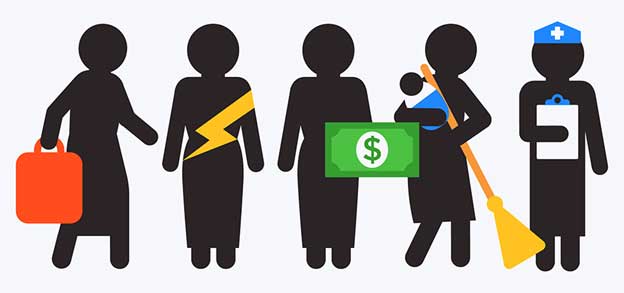It's Time to Find Solutions to the Gendered Consequences of the Pandemic

WASHINGTON DC/SAN DIEGO, Nov 22 (IPS) - The COVID-19 pandemic has had devastating effects across the globe, but the data and evidence show that women have borne the brunt of the crisis. While inequalities in health, economic power, and other areas existed long before the pandemic began, the pandemic has widened these gaps.
Women have suffered greater economic losses than men during the pandemic. They've lost their jobs at greater rates than men and were more likely to see decreases in their income. For example, women comprised 60 percent of job losses between February and April 2020 in South Africa, a study in Chad estimated more women will lose wages as a result of COVID-19 than men (61 percent vs. 57 percent), and a study of 29 countries found that a larger percentage of women lost employment during COVID-19 than men (42 percent vs. 31 percent).
Women business owners also suffered disproportionate losses during the pandemic. Studies found that women-owned businesses were more vulnerable to profit loss and closure during the pandemic. Across South Asia for example, women’s businesses closed at a rate of about 50 percent compared to men’s at 39 percent.
Women’s greater economic losses are in part driven by their role as primary caregivers. The pandemic brought on school closures around the globe which in effect, increased the childcare burdens of women (more than men) and inhibited their ability to engage in paid work.
On the one hand, work from home can allow women to spend more time with children and more easily combine paid work and unpaid care, but on the other hand, it can hinder work-life balance and negatively impact job performance.
Further, very few women workers around the world have the types of jobs that can be done from home, which means that these increased childcare burdens are putting economic empowerment further out of reach for many women.
During the course of the pandemic, research has also revealed a spike in gender-based violence in many places around the world - as lockdowns forced people to stay at home with abusive partners. For example a study from Peru found that both young men and young women experienced an increase in physical domestic violence during lockdown, and that those who had previously experienced violence were more likely to experience it again.
In Zimbabwe, a qualitative study of informal women workers also documents increased instances of gender-based violence due to staying home with abusive spouses.
In Bangladesh, a study on intimate partner violence finds that, overall, 45 percent of women surveyed had experienced intimate partner violence during COVID-19, and that women in arranged marriages, from rural areas, and with lower levels of education were more likely to experience violence.
It’s clear that women’s health and economic standing have been disproportionately hurt by the COVID-19 pandemic. But while extensive research and data has begun to paint the picture of just how devastating the pandemic has been for women, there has been very little research to date on what policies or interventions have been effective in addressing and reversing these new and growing inequalities.
Where limited evidence does exist, it suggests that policy measures to respond to the pandemic have not equally reached and benefited women. As world leaders work to pursue a gender-equal recovery, they must ensure that COVID-19 recovery policies in all areas consider the impact on women and are designed to reach and benefit women.
They must not only look at problems -- but also fund and implement evidence-based solutions, including those aimed at getting cash into the hands of women who have lost employment and income, addressing their disproportionate unpaid care burdens, and preventing gender-based violence.
Megan O’Donnell is a policy fellow at the Center for Global Development and leads the think tank’s COVID-19 Gender & Development Initiative; Shelby Bourgault is a researcher with the gender program at the Center for Global Development and Lotus McDougal is a researcher at UC San Diego School of Medicine's Center on Gender Equity and Health.
Follow @IPSNewsUNBureau
Follow IPS News UN Bureau on Instagram
© Inter Press Service (2021) — All Rights Reserved. Original source: Inter Press Service

